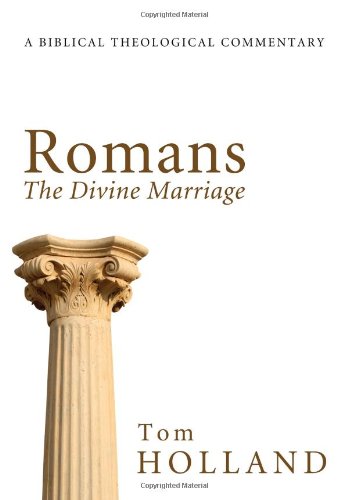Book review: Romans: The Divine Marriage
by Tom Holland
★★★★★
First, my apologies to Tom and PICKWICK Publications for taking so long on this review. The thing is, reading Holland’s take on Romans is like reading a foreign letter. So unfamiliar is Holland’s corporate spin that it took me forever to get through the book … not just because it’s a comprehensive work, but because I wound up reading several passages twice to pull myself away from the more common individualistic interpretation. You’ll learn to recognize two distinct, corporate communities at odds with one another: one in Adam with sin as its head, the other in Christ with Jesus as its head.
This is a verse-by-verse study of the book of Romans, and would make a good university text. Remember: Romans is Paul’s magnum opus, with every verse saturated with meaning. I try to write reviews appropriate for casual readers, but this book belongs in academics as well. Not only is every verse explored, but Holland delves into several topics in detail. I think there are nine such “excursions” peppered throughout the text.
Now, Tom is a conservative believer, so I don’t quite see eye to eye with him on every topic, but his research is deep and not at all preachy. Holland bemoans the way other scholars tend to interpret the New Testament by relying on Greek secular literature, instead of appreciating its Hebraic flavor. “The only allusions or echoes we can safely consider are those which reflect the Old Testament literature” (quotation reprinted without supporting context, which is substantial). So, he digs deep.
This book could sit on your shelf for reference, but that would be a misuse. Holland’s particular interpretation really requires analyzing the letter as a whole. Themes of corporate justification, Passover, the second exodus, and the pilgrimage of God’s chosen resonate throughout, and these underlying themes set the tone for Paul’s more confusing passages. Baptism (dying and rising with Christ) carries a different meaning in this light. Even the word “sin” gets a remake with a corporate meaning: Paul sees sin as a predator, waiting to attack and kill. Try replacing the word “sin” with Satan throughout to get a better grasp of Paul’s meaning. Remember the Adamic community? That’s Satan, not sin, at its head. Also as you read, I suggest you keep the book’s title uppermost in your mind: The Divine Marriage. We’re talking about the eschatological marriage with its great cosmic banquet. Paul’s theology is so deep that it’s easy to lose track of the fact that he really is going somewhere in this letter.
My favorite discussion in the book was Holland’s exposition of the following passage: 10:6-7 But the righteousness that is by faith says: “Do not say in your heart, ’Who will ascend into heaven?’” (that is, to bring Christ down) “or ‘Who will descend into the deep?’” (that is, to bring Christ up from the dead.) After a ten-page explanation, these two verses finally makes sense.












 354 Circles
354 Circles
 603 Goodreads Friends & Fans
603 Goodreads Friends & Fans

 Hello! I'm an author, historical Jesus scholar, book reviewer, and liberal Christian, which means I appreciate and attempt to exercise the humanitarian teachings of Jesus without getting hung up on any particular supernatural or religious beliefs.
The Bible is a magnificent book that has inspired and spiritually fed generations for thousands of years, and each new century seems to bring a deeper understanding of life’s purpose. This is true of not only Christianity; through the years, our age-old religions are slowly transforming from superstitious rituals into humanitarian philosophies. In short, we are growing up, and I am thrilled to be riding the wave.
I avidly read all thought-provoking religion titles. New authors: I'd love to read and review your book!
Hello! I'm an author, historical Jesus scholar, book reviewer, and liberal Christian, which means I appreciate and attempt to exercise the humanitarian teachings of Jesus without getting hung up on any particular supernatural or religious beliefs.
The Bible is a magnificent book that has inspired and spiritually fed generations for thousands of years, and each new century seems to bring a deeper understanding of life’s purpose. This is true of not only Christianity; through the years, our age-old religions are slowly transforming from superstitious rituals into humanitarian philosophies. In short, we are growing up, and I am thrilled to be riding the wave.
I avidly read all thought-provoking religion titles. New authors: I'd love to read and review your book!
 Hi! While Lee writes the articles and reviews the books, I edit, organize, and maintain the blog. The views expressed here are Lee's but I'm his biggest supporter! :-)
Hi! While Lee writes the articles and reviews the books, I edit, organize, and maintain the blog. The views expressed here are Lee's but I'm his biggest supporter! :-)
Connect With Me!